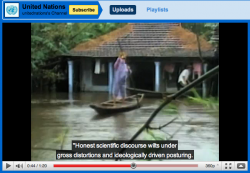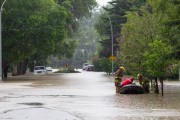Yesterday the InterAcademy Council (IAC), a collaboration among the world's leading national science academies, issued its report on the Intergovernmental Panel on Climate Change (IPCC) — the UN body mandated by governments to conduct regular, comprehensive assessments of the science of climate change.
UN Secretary-General Ban Ki-moon had asked the IAC to conduct an independent review of IPCC processes and procedures after it emerged that the last major IPCC report contained a few errors in the section that projects future impacts of climate change. As numerous distinguished scientists have pointed out, these errors have no effect on the overwhelming evidence that the world is warming, that greenhouse gases from human activities are mostly to blame, and that we face severe global impacts if we don't act urgently to cut emissions.
 Yesterday's IAC report does not change that picture. Rather, the primary message of the IAC report is that the IPCC needs to "fundamentally reform its management structure." This makes complete sense, because the IPCC's current structure is more than two decades old. The importance that governments attach to climate change today, and the volume of scientific knowledge on the topic, are hugely greater today than they were 20 years ago. Structures that were adequate to deal with a limited volume of science, and with a relatively low-profile issue, are clearly no longer appropriate now that climate change is recognized as a top international priority.
Yesterday's IAC report does not change that picture. Rather, the primary message of the IAC report is that the IPCC needs to "fundamentally reform its management structure." This makes complete sense, because the IPCC's current structure is more than two decades old. The importance that governments attach to climate change today, and the volume of scientific knowledge on the topic, are hugely greater today than they were 20 years ago. Structures that were adequate to deal with a limited volume of science, and with a relatively low-profile issue, are clearly no longer appropriate now that climate change is recognized as a top international priority.
In fact, it's impressive that the IPCC has continued to be so successful in the absence of this reform: the IAC report concludes that "the IPCC assessment process has been successful overall and has served society well." The report notes that "the overall structure of the IPCC assessment process appears to be sound, although significant improvements are both possible and necessary for the fifth assessment [the next major IPCC report] and beyond."
As for the handful of errors that appeared in the last major IPCC report, the IAC concludes that the IPCC's review process is "thorough," and "a few such errors are likely to be missed in any review process," although it does recommend that some existing rules be applied more strongly, and others streamlined.
The IPCC already applies a detailed system for attaching estimates of probability or confidence to the statements it makes. However, the IAC says that the IPCC should further refine the way it characterizes uncertainties. The biggest reproach the IAC report makes in this regard is where it says "many statements in the Working Group II Summary for Policy Makers... are assigned high confidence, but are based on little evidence."
This can be easily misunderstood: the IAC is not saying that those IPCC statements are likely to be untrue — but rather that they were based "on a small number of unpublished studies." This is because the statements the IAC appears to be talking about concerned specific regions, and the science of regional impacts is less well developed than our understanding of the seriousness of global impacts of climate change. Certainly the scientists who signed off on those statements should have been more careful, but there is nothing here that affects the scientific case for action on emissions.
The IPCC's opponents can also be expected to seize on the IAC's finding that "alternative views are not always cited in a chapter [of an IPCC report] if the Lead Authors do not agree with them." However, on the very same page, the IAC says: "Although all reasonable points of view should be considered, they need not be given equal weight or even described fully in an assessment report. Which alternative viewpoints warrant mention is a matter of professional judgment."
Finally, some media coverage has noted that the IAC report urges IPCC leaders to avoid "straying into advocacy," to protect the IPCC's credibility. This is no doubt sound advice for those speaking on behalf of the IPCC, but it is surely very difficult for anyone who grasps the scale and urgency of the climate change issue — as documented so admirably by the IPCC — to abstain from calling for the government action that is so clearly needed. So while the IPCC's reports themselves should not recommend policies, the scientists who contribute to and write the reports will certainly continue to advocate for the actions their research tells us we need — and that's a good thing.
Indeed, it is of great significance that the leading national science academies responsible for the IAC report have themselves issued a very clear call for governments to act urgently to cut greenhouse gas emissions.








